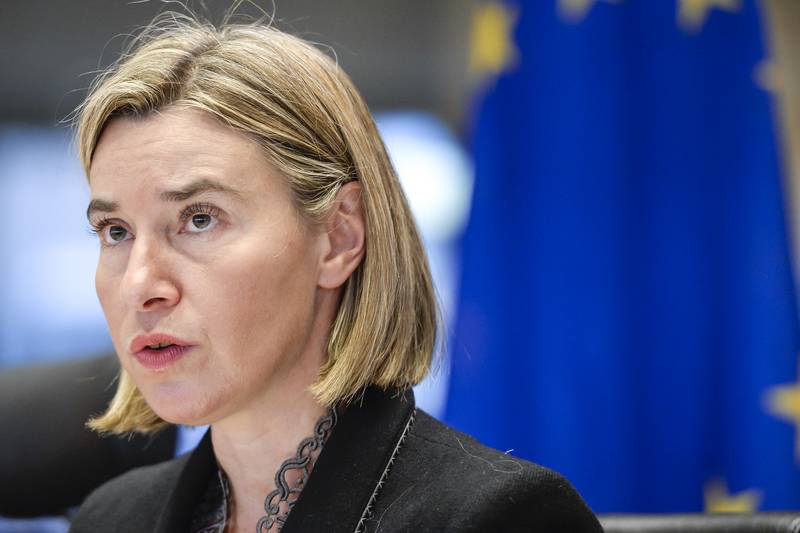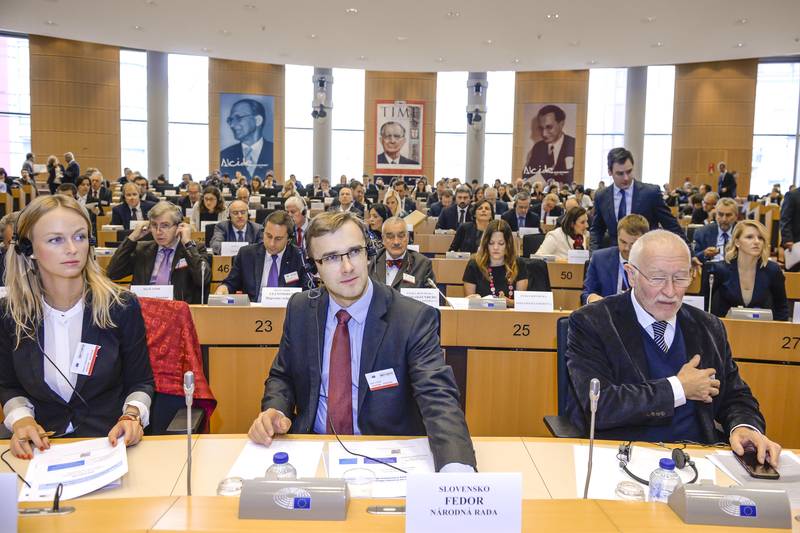Head-on Collision Between Brussels and Member States Regarding EU's Global Strategy
Adelina Marini, November 9, 2016
 The High Representative of the European Union for Foreign Affairs and Security Policy Federica Mogherini (Italy, Socialists and Democrats) presented in front of a joint meeting of the European Parliament’s Foreign Affairs Committee and representatives of national parliaments a plan for the implementation of the EU's global strategy, which the Commission drafted in the summer and there is already ongoing work. During the hour-long debate, however, sparks started to flow between the national parliaments and Brussels. The meeting was scheduled for 9am, but was delayed by half an hour. Following it (at 10am) was a debate with the Bosniak representative in the Bosnia and Herzegovina Presidency, Bakir Izetbegović. This caused tension during the discussion, but Mrs Mogherini struck back by sending the ball back into the national parliaments’ court.
The High Representative of the European Union for Foreign Affairs and Security Policy Federica Mogherini (Italy, Socialists and Democrats) presented in front of a joint meeting of the European Parliament’s Foreign Affairs Committee and representatives of national parliaments a plan for the implementation of the EU's global strategy, which the Commission drafted in the summer and there is already ongoing work. During the hour-long debate, however, sparks started to flow between the national parliaments and Brussels. The meeting was scheduled for 9am, but was delayed by half an hour. Following it (at 10am) was a debate with the Bosniak representative in the Bosnia and Herzegovina Presidency, Bakir Izetbegović. This caused tension during the discussion, but Mrs Mogherini struck back by sending the ball back into the national parliaments’ court.
To Federica Mogherini priority number one in the plan for the implementation of the strategy has to be the work on building resilience in countries, institutions, and societies neighbouring the EU, which is expected to help prevent conflicts and crises. The EU has enough instruments and resources, it just needs to start using and coordinating them well. The second “chapter” of the action plan, which will be thoroughly examined by the EU foreign ministers as well next week, is the enhancement of the connection between the external and the internal aspects of the strategy, especially when talking about migration or terrorism. “Our external policies have a much higher impact if they are supported by a coherent internal policy and vice versa”, said the high representative in her opening statement.
It is quite often, she said, that we hear the mantra that the EU has no unified policy in some areas, while it actually does, especially when talking about foreign affairs or security. The problem, however, is that the communication of common values and goals is not good. Besides, the EU possesses many instruments it does not use because of lack of political will, or because of lack of consensus and sometimes resources as well. Currently, there is an open window of opportunity to change this in the areas of security and defence, believes the high representative. And this window did not open because of the Brexit, but rather because, according to popular opinion, security and defence are priority number one, together with the economic situation and employment.
Tension along the Brussels-national capitals line began to show in the very second statement during the debate. Miranda Calha, vice president of the parliamentary committee on national defence, attempted to comment on several issues, but, following the expiry of the agreed one minute for every statement Chairman Elmar Brok (EPP, Germany) cut him off. “We're members of national parliaments. We're invited to be here. I don’t understand why we have only one minute to say something in relation to our own parliaments and our own countries. This is not agreeable and this is not correct”, replied the offended MP. Chairman Brok explained that having 28 member states and participating MPs three days would be needed to talk to Federica Mogherini.
Many questions followed, mainly aimed at Turkey. British MEP Charles Tannock (ECR) asked what is the way to reverse the dictatorial trajectory of Turkish President Recep Tayyip Erdoğan. Petras Auštrevičius (ALDE, Lithuania) asked the question of how can the EU start to fulfil its promises towards partner states. Another national MP asked how could institutions be strengthened in regions neighbouring the EU, keeping in mind mistakes made in the past in Iraq, Syria, and Libya. He also wanted to know exactly what could be done with Turkey and whether the European position towards Erdoğan could be hardened.
Bodil Valero, MEP from Sweden (Greens/European Free Alliance) noted that EU countries are exporting weapons to problem countries and asked how could strict control be implemented on the export of weapons from the EU. A national parliament MP noted that EU efforts so far have failed both in Turkey and in Syria. There were also questions about the “Nord Stream 2” natural gas pipeline and how it affects EU security; when will the EU start acting, instead of just talking. Former Foreign Affairs Minister of the Czech Republic and current Chairman of the Foreign Affairs Committee in the Czech Parliament Karel Schwarzenberg asked what actions are going to be taken regarding the rapprochement between Erdoğan and Putin. “To older ones, it reminds the rapprochement between Mussolini and Hitler in the 1930s”, he reminded.
The diplomat also sent criticism towards Brussels. “I hear often complaints in the national parliaments [that] they don’t understand Brussels. I will tell you why. This morning the MPs waited half an hour before closed doors of this hall. This arrogance against the elected representatives of the people shows why Brussels isn’t popular outside”. His words got applause and Chairman Brok joked that he should not have let him speak, but agreed that he is correct. There was no explanation for the delay.
Federica Mogherini answered all questions, commentaries, and criticisms decisively by reminding that the EU is what the member states make of it. “There is no some abstract entity, closed somewhere, deciding things without national parliaments, governments. [...] Most of the questions you're putting to me actually are coming back to you for sure”, she said. For example, are member states and their national parliaments interested in going towards a permanent structured cooperation? This is the term introduced by the Treaty of Lisbon, allowing member states to deepen their cooperation in the sphere of military. Something, which Germany and France named “a defence union” in their recent proposal.
This question, continued Mrs Mogherini, will come to your committees in two, three, or six months. How far are you willing to go in cooperation in the defence industry was another question she posed to national MPs. On the issue of Turkey she also sent the question back to capitals. “What is the position of your national parliaments on how should we deal with Turkey?”, she asked and laid out her own position, consisting of three elements. The first one is a direct approach towards Turkish authorities, opposition forces, and the non-government sector. The second is having a clear message. The EU message, as expressed so far, is that rule of law is important to the Union, which includes respect for opposition parties and minorities, but also journalists, academic environments, civil society. It would be beneficial, she believes, that the same message is being sent out by national parliaments as well.

“Because the game of dividing and ruling sometimes is played. But don’t let always some in Brussels speak up”, stressed Federica Mogherini. Regarding “Nord Stream 2” she reminded that the position of the Union’s foreign ministers is that Ukraine should remain a natural gas transit state. “To me, it is of strategic importance Ukraine is kept as a key transit of gas. Here, as well, you have some work to do at home”, underlined the top diplomat of the EU. Criticism followed towards member states regarding migration policies as well. “Because at the moment, let's say that the resettlement and relocation schemes concerning the internal responsibility sharing is a little bit lagging behind if you allow me to be a little bit diplomatic”. If external measures do work then responsibility should be taken at home as well. “I leave you with that”, she said at the closing of the debate.
While the debate was going on, the official declaration by the High Representative regarding the situation in Turkey was published. In it, the EU expresses serious concerns about events in the country, like the renewal of the discussion on implementing the death penalty, restrictions on the freedom of speech, social media included, the closing down of media outlets, and the arrests of journalists. “[These] are extremely worrying developments which weaken the rule of law, the respect for human rights and fundamental freedoms and compromise parliamentary democracy in Turkey, while exacerbating tensions in the Southeast and further polarising Turkish society in general”, is said in the declaration. There are more and more voices in the EU, calling for the termination of accession negotiations with Turkey. Today (November 9th) the European Commission is going to present the report on Turkey’s progress in the negotiation process.
Translated by Stanimir Stoev
 Federica Mogherini | © Council of the EU
Federica Mogherini | © Council of the EU | © Council of the EU
| © Council of the EU Luis De Guindos | © Council of the EU
Luis De Guindos | © Council of the EU